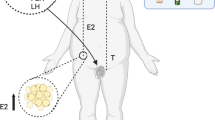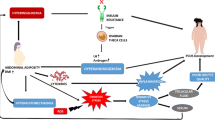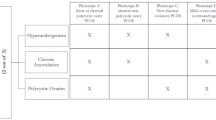Abstract
We hypothesized that magnesium supplementation might help improve metabolic profiles and clinical symptoms of polycystic ovary syndrome (PCOS) through its role in insulin action. The present study aimed to investigate the effect of magnesium supplementation on metabolic profiles and levels of sex hormones in women with PCOS. In this parallel randomized, double-blind, placebo-controlled clinical trial, 60 women with PCOS aged 20–45 years were recruited. After stratification for body mass index (BMI), age, and types of medications, participants were randomly assigned to consume magnesium supplements (containing 250 mg magnesium oxide) or placebo for 8 weeks. To assess biochemical indicators, a venous blood sample was taken after an overnight fasting. The mean age of study participants was 26.4 years. We found that magnesium supplementation for 8 weeks among women with PCOS had favorable effects on BMI compared with the placebo group (changes from baseline in intervention group: − 0.31 ± 0.07 vs. 0.07 ± 0.09 kg/m2 in control group). In addition, the supplementation lead to preventing the increase in waist circumference in intervention group compared with the control group (0.02 vs. 1.15 cm). No significant effects on glycemic variables and lipid profile were seen following the magnesium supplementation. A significant increase in serum LH levels in intervention group and a decrease in placebo group were observed (P = 0.01). Although we found a significant decrease in serum testosterone levels in intervention and placebo groups, comparing the changes between the two groups, a marginally significant difference in serum testosterone levels was found (51.65 vs. 47.80 in intervention, 43.41 vs. 39.46 in placebo, P = 0.08). A significant increase in serum dehydroepiandrogens (DHEA) (136.32 vs. 172.37 intervention, 102.74 vs. 120.15 placebo, P = 0.01) was seen in two groups. Magnesium supplementation had no significant effects on FSH, 17OH-progesteron, sex hormone–binding globulin (SHBG), and free androgen index (FAI) levels. We found evidence indicating that magnesium supplementation did not influence serum lipid profiles and glycemic indicators among women with PCOS. Magnesium supplementation resulted in reduced BMI and testosterone levels as well as increased DHEA concentrations in women with PCOS. Also, magnesium supplementation may increase serum LH levels. ClinicalTrials.gov IRCT registration no. NCT02178150



Similar content being viewed by others
Abbreviations
- PCOS:
-
Polycystic ovary syndrome
- FPG:
-
Fasting plasma glucose
- BMI:
-
Body mass index
- DHEA:
-
Dehydroepiandrogens
- Mg:
-
Magnesium
- SHBG:
-
Sex hormone–binding globulin
- FAI:
-
Free androgen index
- HOMA-IR:
-
Homeostatic model assessment of insulin resistance
- HOMA-B:
-
Homeostatic model assessment of β-cell function
- QUICKI:
-
Quantitative insulin sensitivity check index
- CV:
-
Coefficients of variability
- SD:
-
Standard deviation
- BP:
-
Blood pressure
References
Du D, Li X (2013) The relationship between thyroiditis and polycystic ovary syndrome: a meta-analysis. Int J Clin Exp Med 6(10):880–889
Douglas CC, Gower BA, Darnell BE, Ovalle F, Oster RA, Azziz R (2006) Role of diet in the treatment of polycystic ovary syndrome. Fertil Steril 85(3):679–688
Qin JZ, Pang LH, Li MJ, Fan XJ, Huang RD, Chen HY (2013) Obstetric complications in women with polycystic ovary syndrome: a systematic review and meta-analysis. Reprod Biol Endocrinol 11:56
Harrison CL, Lombard CB, Moran LJ, Teede HJ (2011) Exercise therapy in polycystic ovary syndrome: a systematic review. Hum Reprod Update 17(2):171–183
Chakraborty P, Ghosh S, Goswami SK, Kabir SN, Chakravarty B, Jana K (2013) Altered trace mineral milieu might play an aetiological role in the pathogenesis of polycystic ovary syndrome. Biol Trace Elem Res 152(1):9–15
Barbagallo M, Dominguez LJ, Resnick LM (2007) Magnesium metabolism in hypertension and type 2 diabetes mellitus. Am J Ther 14(4):375–385
Olatunji LA, Soladoye AO (2007) Effect of increased magnesium intake on plasma cholesterol, triglyceride and oxidative stress in alloxan-diabetic rats. Afr J Med Med Sci 36(2):155–161
Nielsen FH, Johnson LK, Zeng H (2010) Magnesium supplementation improves indicators of low magnesium status and inflammatory stress in adults older than 51 years with poor quality sleep. Magnes Res 23(4):158–168
Hadjistavri LS, Sarafidis PA, Georgianos PI, Tziolas IM, Aroditis CP, Hitoglou-Makedou A et al (2010) Beneficial effects of oral magnesium supplementation on insulin sensitivity and serum lipid profile. Med Sci Monit 16(6):Cr307–Cr312
Mooren FC, Kruger K, Volker K, Golf SW, Wadepuhl M, Kraus A (2011) Oral magnesium supplementation reduces insulin resistance in non-diabetic subjects - a double-blind, placebo-controlled, randomized trial. Diabetes Obes Metab 13(3):281–284
Sharifi F, Mazloomi S, Hajihosseini R, Mazloomzadeh S (2012) Serum magnesium concentrations in polycystic ovary syndrome and its association with insulin resistance. Gynecol Endocrinol 28(1):7–11
Lima de Souza ESML, Cruz T, Rodrigues LE, Ladeia AM, Bomfim O, Olivieri L et al (2014) Magnesium replacement does not improve insulin resistance in patients with metabolic syndrome: a 12-week randomized double-blind study. J Clin Med Res 6(6):456–462
Jamilian M, Kazemi Sabzevar NK, Asemi Z (2019) The effect of magnesium and vitamin E co-supplementation on glycemic control and markers of cardio-metabolic risk in women with polycystic ovary syndrome: a randomized, double-blind, placebo-controlled trial. Horm Metab Res 51:100–105
Maktabi M, Jamilian M, Asemi Z (2018) Magnesium-zinc-calcium-vitamin D co supplementation improves hormonal profiles, biomarkers of inflammation and oxidative stress in women with polycystic ovary syndrome: a randomized, double-blind, placebo-controlled trial. Biol Trace Elem Res 182:21–28
Muneyyirci-Delale O, Kaplan J, Joulak I, Yang L, Von Gizycki H, Nacharaju VL (2013) Serum free fatty acid levels in PCOS patients treated with glucophage, magnesium oxide and spironolactone. Gynecol Endocrinol 29(5):474–477
Asemi Z, Hashemi T, Karamali M, Samimi M, Esmaillzadeh A (2013) Effects of vitamin D supplementation on glucose metabolism, lipid concentrations, inflammation, and oxidative stress in gestational diabetes: a double-blind randomized controlled clinical trial. Am J Clin Nutr 98(6):1425–1432
Pisprasert V, Ingram KH, Lopez-Davila MF, Munoz AJ, Garvey WT (2013) Limitations in the use of indices using glucose and insulin levels to predict insulin sensitivity: impact of race and gender and superiority of the indices derived from oral glucose tolerance test in African Americans. Diabetes Care 36(4):845–853
Rautio K, Tapanainen JS, Ruokonen A, Morin-Papunen LC (2006) Endocrine and metabolic effects of rosiglitazone in overweight women with PCOS: a randomized placebo-controlled study. Hum Reprod 21(6):1400–1407
Almoznino-Sarafian D, Berman S, Mor A, Shteinshnaider M, Gorelik O, Tzur I et al (2007) Magnesium and C-reactive protein in heart failure: an anti-inflammatory effect of magnesium administration? Eur J Nutr 46:230–237
Kishimoto Y, Tani M, Uto-Kondo H, Saita E, Iizuka M, Sone H, Yokota K, Kondo K (2010) Effects of magnesium on postprandial serum lipid responses in healthy human subjects. Br J Nutr 103:469–472
Rayssiguier Y, Gueux E (1986) Magnesium and lipids in cardiovascular disease. J Am Coll Nutr 5:507–519
Kowluru A, Chen HQ, Modrick LM, Stefanelli C (2001) Activation of acetyl-CoA carboxylase by a glutamate- and magnesium-sensitive protein phosphatase in the islet beta-cell. Diabetes. 50:1580–1587
Murakami M, Ishizuka J, Sumi S, Nickols GA, Cooper CW, Townsend CM Jr, Thompson JC (1992) Role of extracellular magnesium in insulin secretion from rat insulinoma cells. Proc Soc Exp Biol Med 200:490–494
Rodriguez-Moran M, Guerrero-Romero F (2003) Oral magnesium supplementation improves insulin sensitivity and metabolic control in type 2 diabetic subjects: a randomized double-blind controlled trial. Diabetes Care 26(4):1147–1152
van Dam RM, Hu FB, Rosenberg L, Krishnan S, Palmer JR (2006) Dietary calcium and magnesium, major food sources, and risk of type 2 diabetes in U.S. black women. Diabetes Care 29(10):2238–2243
Dickinson HO, Mason JM, Nicolson DJ, Campbell F, Beyer FR, Cook JV et al (2006) Lifestyle interventions to reduce raised blood pressure: a systematic review of randomized controlled trials. J Hypertens 24(2):215–233
Barbagallo M, Dominguez LJ, Galioto A, Ferlisi A, Cani C, Malfa L et al (2003) Role of magnesium in insulin action, diabetes and cardio-metabolic syndrome X. Mol Asp Med 24(1–3):39–52
Lopez-Ridaura R, Willett WC, Rimm EB, Liu S, Stampfer MJ, Manson JE et al (2004) Magnesium intake and risk of type 2 diabetes in men and women. Diabetes Care 27(1):134–140
Larsson SC, Wolk A (2007) Magnesium intake and risk of type 2 diabetes: a meta-analysis. J Intern Med 262(2):208–214
Guerrero-Romero F, Rodriguez-Moran M (2005) Complementary therapies for diabetes: the case for chromium, magnesium, and antioxidants. Arch Med Res 36(3):250–257
Guerrero-Romero F, Tamez-Perez HE, Gonzalez-Gonzalez G, Salinas-Martinez AM, Montes-Villarreal J, Trevino-Ortiz JH et al (2004) Oral magnesium supplementation improves insulin sensitivity in non-diabetic subjects with insulin resistance: a double-blind placebo-controlled randomized trial. Diabetes Metab 30(3):253–258
Ma B, Lawson AB, Liese AD, Bell RA, Mayer-Davis EJ (2006) Dairy, magnesium, and calcium intake in relation to insulin sensitivity: approaches to modeling a dose-dependent association. Am J Epidemiol 164(5):449–458
Wang JL, Shaw NS, Yeh HY, Kao MD (2005) Magnesium status and association with diabetes in the Taiwanese elderly. Asia Pac J Clin Nutr 14(3):263–269
Paolisso G, Barbagallo M (1997) Hypertension, diabetes mellitus, and insulin resistance: the role of intracellular magnesium. Am J Hypertens 10(3):346–355
Sibai BM (2005) Diagnosis, prevention, and management of eclampsia. Obstet Gynecol 105(2):402–410
Dickinson HO, Nicolson DJ, Campbell F, Cook JV, Beyer FR, Ford GA et al (2006) Magnesium supplementation for the management of essential hypertension in adults. Cochrane Database Syst Rev (3):Cd004640
Itoh K, Kawasaka T, Nakamura M (1997) The effects of high oral magnesium supplementation on blood pressure, serum lipids and related variables in apparently healthy Japanese subjects. Br J Nutr 78(5):737–750
Kawano Y, Matsuoka H, Takishita S, Omae T (1998) Effects of magnesium supplementation in hypertensive patients: assessment by office, home, and ambulatory blood pressures. Hypertension (Dallas, Tex : 1979) 32(2):260–265
Kauffman RP, Tullar PE, Nipp RD, Castracane VD (2011) Serum magnesium concentrations and metabolic variables in polycystic ovary syndrome. Acta Obstet Gynecol Scand 90(5):452–458
Rajeswari G, Veerabhadrudu B, Suresh E (2016) Study of magnesium levels in polycystic ovarian syndrome. International J of Applied Research 2(3):610–613
Esmaeilzadeh S, Andarieh MG, Ghadimi R, Delavar MA (2015) Body mass index and gonadotropin hormones (LH & FSH) associate with clinical symptoms among women with polycystic ovary syndrome. Glob J Health Sci 7:101–106
Acknowledgments
This study was extracted from a MSc dissertation which was approved by the School of Nutrition and Food Sciences, Isfahan University of Medical Sciences (No. 193021). We wish to thank all individuals who kindly participated in our study.
Funding
The financial support for this study comes from the Food Security Research Center, Isfahan University of Medical Sciences, Isfahan, Iran.
Author information
Authors and Affiliations
Contributions
MF, LA, FM, PS, and AE contributed in conception, design, statistical analyses, data interpretation, and manuscript drafting. All authors approved the final manuscript for submission.
Corresponding author
Ethics declarations
The study was approved by the ethics committee of Isfahan University of Medical Sciences.
Conflict of Interest
The authors declare that they have no conflicts of interest.
Additional information
Publisher’s Note
Springer Nature remains neutral with regard to jurisdictional claims in published maps and institutional affiliations.
Rights and permissions
About this article
Cite this article
Farsinejad-Marj, M., Azadbakht, L., Mardanian, F. et al. Clinical and Metabolic Responses to Magnesium Supplementation in Women with Polycystic Ovary Syndrome. Biol Trace Elem Res 196, 349–358 (2020). https://doi.org/10.1007/s12011-019-01923-z
Received:
Accepted:
Published:
Issue Date:
DOI: https://doi.org/10.1007/s12011-019-01923-z




